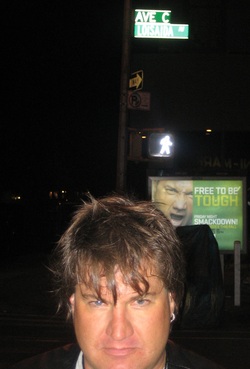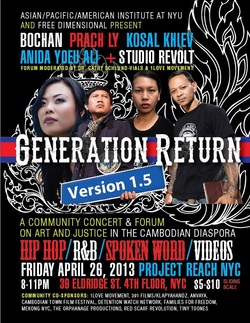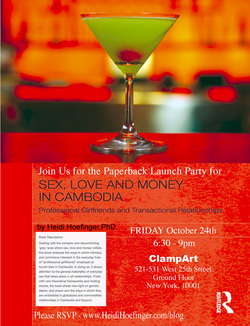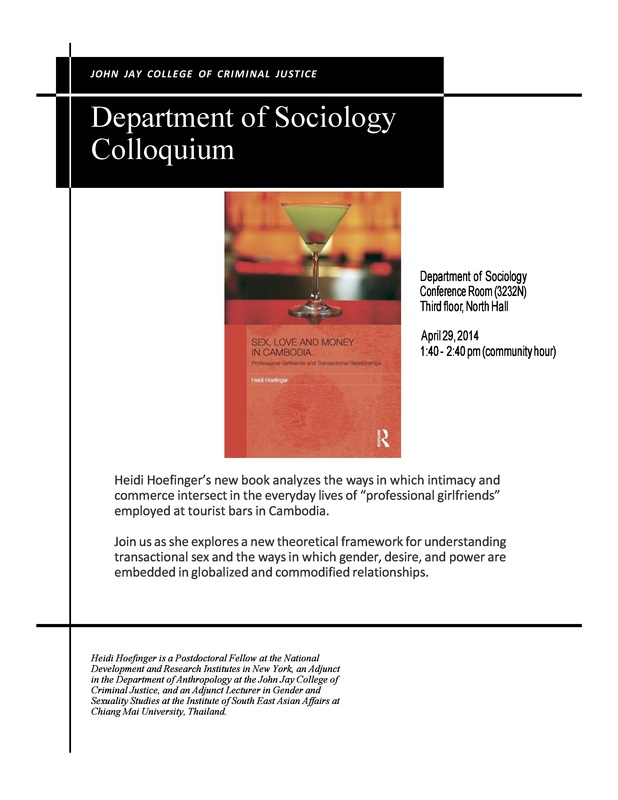| After months of waiting, the paperback version of Sex, Love and Money in Cambodia has finally been released. I've been holding off on a proper celebration until now so that people can actually afford the book! Please join us in New York on October 24, 2014 at the new venue: ClampArt, 521-531 West 25th Street, at 6:30pm. There will be nibbles, wine and a short reading from the book. I'm looking forward to celebrating and publicly thanking all the wonderful people who have helped make this happen. The event is FREE, but please register for tickets so that we can keep track of numbers: http://www.eventbrite.co.uk/e/paperback-book-launch-party-for-sex-love-and-money-in-cambodia-change-of-venue-tickets-13329465791 And if you cannot make it to the event, but would still like to buy the book at the 20% discount, use this code on the Routledge website: FLR40: http://www.routledge.com/books/details/9780415629348/ OR you can find it on amazon! http://www.amazon.com/Heidi-Hoefinger/e/B00ABNB4K6 Thanks! Hope to see you at the launch! --Heidi |
|
0 Comments
JOHN JAY COLLEGE OF CRIMINAL JUSTICE Department of Sociology Colloquium Department of Sociology Conference Room (3232N) Third floor, North Hall April 29, 2014 1:40 - 2:40 pm (community hour) Heidi Hoefinger’s new book analyzes the ways in which intimacy and commerce intersect in the everyday lives of “professional girlfriends” employed at tourist bars in Cambodia. Join us as she explores a new theoretical framework for understand transactional sex and the ways in which gender, desire, and power and embedded in globalized and commodified relationships. Heidi Hoefinger is a Postdoctoral Fellow at the National Development and Research Institutes in New York, an Adjunct in the Department of Anthropology at the John Jay College of Criminal Justice, and an Adjunct Lecturer in Gender and Sexuality Studies at the Institute of South East Asian Affairs at Chiang Mai University, Thailand.  Wafts of sweet-smelling pine and skunk drift under my nostrils as he approaches. A broad shouldered, tanned and blond-haired presence in surf shorts and mirrored sunglasses saunters over to the bar and introduces himself. It’s 2003, just after the infamous ‘Blackout’ in NYC and we’re in the dank and dark Bar 169, a Lower Eastside institution on the corner of East Broadway and Essex that was second home to the enigma known in those parts as ‘the Professor’. Looking like an incongruous mix between a California surfer dude and a cop, I would quickly learn that Dr Steve Sifaneck (or simply Dr Steve to many) was a renowned sociologist, drug researcher, and stealthy ethnographer with a literal PhD in cannabis consumption and sales. A decade after that first encounter, Dr Steve graced his local dive bar one last time the night before he left this earth on Sunday, May 19, 2013. A shock to the academic community, and those friends and family closest to him, his premature departure at 46 has left a sudden hole in the lives of many. Students devoted to his ‘fun’, ‘interesting’ and ‘cool’ teaching style, and the way he ‘keeps it real’, were left with confusion and sadness when he didn’t show up to teach his criminology lecture at Berkeley College on Monday. His glowing reviews on ratemyprofessor.com reveal that he influenced a generation of young scholars in the fields of sociology, anthropology, criminology and drug research. And the regulars at Bar 169 surely felt the physical absence of ‘the Professor’ that Monday night. Tucked away in the backroom of the bar, I, myself, mourned the loss of someone, who, a decade earlier, would undoubtedly alter the course of my life and career. Friends first, we spent many an afternoon riding bikes, eating out in Chinatown, or going to see free concerts in the park, such as George Clinton and Patti Smith. But Dr Steve would also go on to be an influential mentor and colleague over the years. In 2005, he was the second reader on my Master’s thesis in Anthropology at Hunter College, CUNY. And in 2006, he introduced me to the Society for the Study of Social Problems (SSSP), an organization and annual conference that would see us present on similar panels in Montreal, NYC, Las Vegas and Denver. He gave useful comments on my PhD dissertation, he graces the acknowledgements of my new book (Sex, Love and Money in Cambodia), and he invited me to guest lecture in his class at Berkeley College. And it is also thanks to Steve that I was first introduced to the National Development and Research Institutes (NDRI) several years back—which is where I currently hold my own postdoctoral fellowship. Known for his PhD research at CUNY Graduate Center on cannabis use and sales in NYC and Rotterdam, Dr Steve also did extensive ethnographic research through NDRI on drug users, drug markets and subcultures, with a focus on global marijuana users and retailers, heroin-using lap dancers in NYC, and Mexican drug gangs and sex workers. At Berkeley, he was currently doing comparative work on global drug policy. During his post at NDRI, he published several papers with Eloise Dunlap, Charles Kaplan, Sam Friedman, Andrew Golub, Ellen Benoit and the late Bruce Johnson, to name a few. And in 2009, Dr Steve and his co-authors (Johnson, Golub, and Dunlap) were winners of the Outstanding Paper Award from Jim Walther for the paper titled An Analysis of Alternatives to New York City’s Current Marijuana Arrest and Detention Policy, (Policing: An International Journal of Police Strategies & Management, 2008). The article was chosen by the editorial team as the journal’s most impressive piece of the year. In addition to his faculty post at Berkeley College, he lectured extensively within the CUNY system, at Hunter College, John Jay, and College of Staten Island. There will be a gap in the program at this year’s 63rd Annual SSSP Conference, taking place in August in New York City, where he was set to present at, and chair a panel titled ‘Global Innovations in Drug Policy’. It was during this same conference in NY in 2007 that Steve led informal tours of notorious historical drug spots in downtown NYC, which was yet another opportunity to flaunt his extensive subcultural drug knowledge. This was the Steve those closest to him knew and loved, as he lived life like an ethnography--an ongoing project of life on the edge. His passing far too soon and sudden, memories of Dr Steve and his important contributions will echo in the halls of sociology and criminology departments for decades to come. Scholar, teacher, mentor, friend…the Professor will be missed.  On the 4th floor of a well-used KTV building in Chinatown, New York City, the Cambodian-American community and their friends gathered on April 26, 2013 to celebrate Cambodian hip hop and arts while drawing attention to the troubling issue of forced deportation that is shaking their community. The evening was momentous. Curated by first generation Muslim Khmer artist, Anida Yeou Ali, and taking place in a space donated by Project Reach (a youth organizing and community empowerment space), the program included live poetry from Anida; live hip hop from Khmer-American rapper, PraCh Ly; and a live set by Neo-Cambodia indie-pop singer, Bochan. The program was interspersed with short films and videos produced by Studio Revolt, an independent artist run media lab and collaborative space based in Phnom Penh, founded by Anida and her partner and filmmaker, Masahiro Sugano. The films included 'Why I Write' and 'Moments in Between the Nights' --spoken word pieces performed by Khmer Exiled American poet, Kosal Khiev, who spent 14 years in the US prison system (which included a year-and-a-half term of solitary confinement) for a gang crime he committed at 16 years old. Kosal had also sent a poignant and personalized video message recorded in Phnom Penh the night before the event, where he described some of his experiences as the informal 'night watchman' of his prison dorm, an experience which inspired him to write, 'Moments in Between the Nights'. The trailer for 'Cambodian Son', Masahiro's documentary about Kosal's life since deportation, and his experiences as London's 2012 Cultural Olympiad, was also screened. Another hit of the night, which brought tears to the eyes of many, was Studio Revolt's piece titled 'My Asian Americana'--a short film which focuses on memories of 'Americana' presented by both exiled and expatriate Asian-Americans living in Phnom Penh. In an show of cultural and national identity, each of the exiles and expatriates were clad in American flags and recited the Pledge of Allegiance to the country which (ironically) deported half of them back to Cambodia. The next film featured the emotional reunion of returnee, Zar, with his wife Tyna in Phnom Penh. Zar was deported back to Cambodia 13 years after having finished his prison sentence. He was ripped away from his wife, children, and job as a laser technician. The film documents Zar and Tyna describing the horrendous day when he never returned home from his ICE (Immigration and Customs Enforcement) check-in. The film is a grim reminder of how devastating these deportations are for those left behind, and how unjust the system is, considering he served his debt to society 13 years earlier for a crime he committed as a teenager. There were also two films dedicated to the work of Tiny Toones, an Phnom Penh-based NGO which provides a safe, positive environment for at‐risk youth to channel their energy and creativity into the arts and education through hip hop and street dance. The first informational film featured the founder and returnee, Tuy 'Kay Kay' Sobil; the second was a new music video collaboration between Tiny Toones and Klap Ya Handz ('an independent hip hop and alternative music family thats changing the face of Khmer music') called 'Anakut', which featured young Khmer youth in a parody of doing grown up jobs. The film segment was followed by a community discussion around social justice and the problems associated with the criminalization and deportation of political refugees. Some audience members bravely took the mic to express their thoughts on the event and the importance of hip hop in the Khmer community. Others, such as Dimple and Sarath stood up to explain a little about PRYSM (Providence Youth Student Movement), and what's being done in Rhode Island and Massachusetts in the fight against racial profiling of Khmer youth. They also spoke about the visibility and growth of the Khmer LGBTQ movement on the East Coast and beyond. In a show of solidarity, both were wearing matching t-shirts that read 'My Color is Not a Crime'. Finally, Mia-Lia from the 1 Love Movement in Philadelphia took the mic to speak about the history of their movement against the deportation of Khmer-Americans. She (and Anida and Dimple) explained that it was ultimately the fault of the US that Cambodians are in America, in the first place, and now it is the fault of the US government that so many Khmer families continue to be ripped apart and experience loss due to deportations. In a nutshell, it was the US government who carpet bombed Cambodia during the Nixon/Kissinger era in the 1970s, which allowed the Khmer Rouge regime to gain power and ultimately slaughter 1.7 millions Khmers. It was then that the US government welcomed thousands of Khmer as political refugees into the US, where they suffered further structural discrimination, disenfranchisement, poverty, and gang violence. It was then ultimately the US government who incarcerated them, and are now forcibly deporting them back to Cambodia--a country many have never stepped foot in since most were born in Thai refugee camps. An audience member stood up and bravely admitted she had never even heard of this issue--a fact that is, sadly, not uncommon, and the reason important events like this one need to continue happening. The night ended with an emotional impromptu rendition of 'Stand By Me' sung by Bohcan, joined by PraCh Ly. They encouraged everyone to participate, and by the end, nearly the entire audience, myself included, had joined them in a show of love and solidarity on the stage. Through the arts, hip hop, spoken word, poetry and discussion, the evening was critically important in drawing attention to the injustices taking place within the Khmer community both in the US and Cambodia. Despite exclusion from the official Seasons of Cambodia Arts Festival programming, Anida and others fought hard to make this event happen. It's another example of the endless fighting spirit of the Khmer community. Thank you for never giving up. |
Heidi Hoefinger, PhDThoughts, experiences, reviews. Archives
October 2016
Categories
All
|



 RSS Feed
RSS Feed